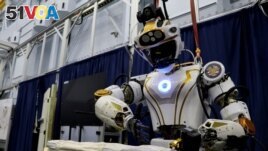01 January 2024
The American space agency NASA's human-like robot Valkyrie looks powerful. It stands 188 centimeters tall and weighs 136 kilograms.
Valkyrie is named after supernatural females in Norse mythology. The robot is being tested at the Johnson Space Center in Houston, Texas.
The robot is designed to operate in "...damaged human-engineered environments," like areas hit by natural disasters, NASA said.

NASA's humanoid robot Valkyrie opens a bag at the Johnson Space Center in Houston, Texas, U.S., November 16, 2023. (REUTERS/Evan Garcia)
But robots like Valkyrie could also work in space one day.
Robots that look like humans, or humanoid robots, have a torso, head, two arms and two legs. Engineers believe that humanoid robots will be able to work similarly to humans and use the same tools and equipment. They just need the right software.
NASA Dexterous Robotics team leader Shaun Azimi said humanoid robots in space could do dangerous jobs. Such jobs include cleaning solar panels or dealing with equipment outside the spacecraft. As a result, human astronauts could pay more attention to exploration and discovery.
"We're not trying to replace human crews, we're really just trying to take the dull, dirty and dangerous work off their plates to allow them to focus on those higher-level activities," Azimi said.
NASA is partnering with robotics companies like Apptronik, which is based in Austin, Texas. The goal is to learn how humanoid robots developed for purposes on Earth could help the development of future humanoid robots meant for space.
Apptronik is developing Apollo, a humanoid robot whose jobs on Earth will include working in warehouses and manufacturing plants. The robot can move packages and organize objects. Apptronik plans to start providing the humanoid robots to companies in early 2025.
Apptronik Chief Technology Officer Nick Paine said Apollo has strengths in comparison to humans.
"We're targeting having this system online 22 hours a day," Paine said. "This does have a swappable battery, so you can work for four hours, swap the battery and then keep going."
Apptronik chief Jeff Cardenas said there are many possibilities as new software and development increase Apollo's abilities.
"The approach is we're starting in the warehouse and on the manufacturing floor, but then it can move into retail...to delivery and out more into what we call unstructured spaces," Cardenas said.
In years to come, those "unstructured" areas could include space, Azimi said. He said the robots are being designed so they can be easily changed to do many different jobs.
"Robots like Apollo are designed with modularity in mind to be able to adapt to many applications," Azimi said.
Azimi added that NASA is aiming to find out what areas it needs to look into "to bring a terrestrial system into the space environment..."
I'm John Russell.
Evan Garcia reported on this story for Reuters. John Russell adapted it for VOA Learning English.
_______________________________________________
Words in This Story
mythology – n. the myths of a particular group or culture
torso –n. the part of the human body below the neck and above the waist
dull – adj. not interesting
solar panel – n. a flat piece of equipment that uses the sun's light or heat to create electricity
focus – v. to direct your attention or effort at something specific
swappable –adj. describes an act of giving or taking one thing in return for another thing
battery –n. a device that stores electricity and provides direct electrical current to electronics
delivery –n. the act of taking something from one place to another
modularity – n. the quality of consisting of separate parts
application – n. the ability to be used for practical purposes
terrestrial –adj. related to on happening on the Earth